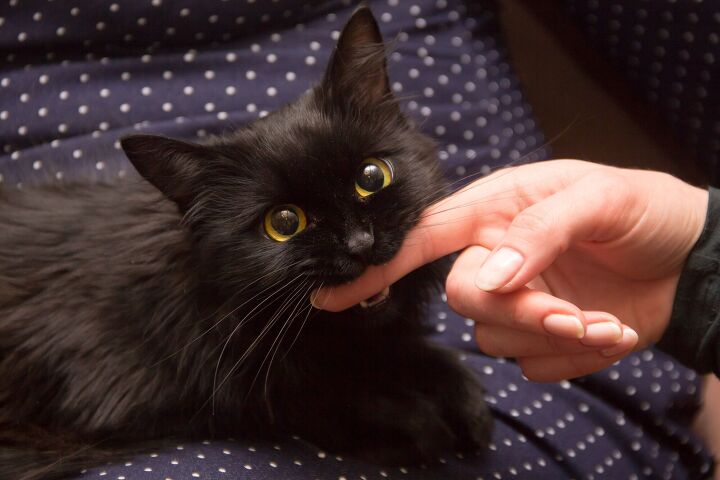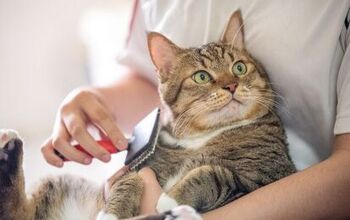There are many reasons why a cat bites – here’s what you can do about it
Do you have a rambunctious kitty who often mistakes your hands and fingers for chew toys? Are you often the target of unsolicited kitty terror? Well, you are not the only one – the nasty biting habit can be a common occurrence amongst felines. Cat bites can be painful, not to mention upsetting, and you should take the right steps to train your cat that biting isn’t okay and that she should be chewing on its toys instead. Fixing this issue can take a little bit of patience and work, but with diligence, you can quickly put the matter aside and rest assured that undesired cat bites will be a thing of the past. To help you with this, we’ve laid out some tips that will help you teach your cat that biting isn’t allowed so that you can interact with her without having to worry about her teeth sinking into your skin.
Establish the Right Types of Play
No matter how old your cat is, you should establish right away that your hands aren’t toys and, therefore, should never be bitten. To establish this as easy as possible, it is crucial to set up boundaries quite early on in your pet-owner relationship. If it’s a kitten you share your home with, rules will be easier to establish, as these little furballs are more eager to learn and accept rules easily. If, on the other hand, you are a new owner of a teenage or adult cat, setting down rules could be slightly more challenging if you’re new to cat ownership. Either way, if you rely on positive reinforcement and patient observations, you can come through and achieve your goal. Cats like to bite down on things when they play, whether it’s a string or a catnip toy or even another cat, so it shouldn’t come as a surprise that they would do the same to your fingers and hands. Even though it may be tempting and may seem innocent enough to let a tiny kitten chew on your fingers, don’t let her get into this bad habit. Otherwise, once your kitten grows into a full grown cat with big fangs, you’ll regret it. To that end, it is vital that you establish the right types of play and to help your cat understand the difference between your hand and her usual toy.
Related: Why Playtime Is So Important For Your Cat
Figure Out What Triggers the Biting
Kitties have different personalities, same as people do. Some are lazy, some are cuddly, and some are straight out mischievous. This last type of character may be the bitiest out there, but sometimes, it isn’t the character that triggers the habit of biting you. Sometimes you can prevent biting altogether by simply figuring out what triggers cat bites. For example, does stress cause your kitty to become defensive or aggressive? Perhaps she becomes uneasy when friends are at your house and you bring her out for everyone to see him. Or maybe your cat becomes a little too aggressive if children in the family start playing too rough with her. Perhaps you own several cats, or a cat and dogs? This environment might not be ideal for your cat, and stress can quickly build up. Try to examine your pet’s behavior closely whenever cat bites occur, taking note of what was going on at the time of the biting so that you can pinpoint a potential cause. If you notice a trend, you will be able to take steps to reduce the stress, defensiveness, or aggressiveness that leads to the biting. Of course, as a responsible owner, you should always aim to offer the best possible living conditions to your loving pet. With minimal stress and pressures in the home, your pet should not display negative habits.
Related: Common Bad Cat Behavior Issues And How To Fix Them
Get Plenty of Toys or a Companion for Your Kitty
Boredom is the bane of every existence – your four legged feline friend included! When nothing seems interesting and days become a worn out routine, your cat might realize that it is endlessly amusing to bite their owner. Still, you won’t find it so funny, so aim to always keep your kitty entertained and occupied. If your cat becomes bored, she may lash out and begin biting in an attempt to release pent-up energy and act out natural instinct to hunt and kill prey. Providing a variety of toys is a great way to help get her energy out, get some much needed exercise, and pretend to be the predator that she was born to be. Dangling, jangling, fluffy and fast, these toys come in all shapes and sizes, and mimic the natural prey of a cat. If this doesn’t work, consider getting your kitty a fellow feline that could be her companion whenever you aren’t home. This tactic, combined with the toys and daily play sessions, will prevent boredom and, provided that your cat adjusts well to the newcomer, may also prevent biting. Likewise, if you are too crude and strict with your cat, she might develop bad habits. Always show affection and let your pet know that they are loved and appreciated. A cat in a warm and welcoming environment might not resort to a nasty habit such as biting.
Assert Your Dominance
When it comes to training felines, positive reinforcement is always the way to go. This is because punishments and scolding may cause your cat to become frightened and stressed, and may not even be effective in training your cat to change her behavior. Remember that cats are willful and hard-headed: they won’t do well to pressure and stubborn training. Basically, bribery is necessary, and that is why positive reinforcement is crucial. But it still needs to be done with an air of strictness and dominance. So, instead of swatting your cat or shouting at her when she bites, you can try clapping your hands and asserting your dominance by staring directly at her before leaving her alone for a few minutes. You should also say the word “no” in an assertive manner. The key is to be the dominant figure in the house without frightening or stressing out your cat. This is easier to do if your pet is neutered or spayed, which is another great reason to get that done once your kitty is old enough. And when your cat does behave and play well, be sure to reward the good behavior in order to reinforce it. Remember that time always yields results: if you are patient enough and follow the pattern of positive reinforcement, you are bound to notice results in a matter of weeks, sometimes even days. Cats are quick learners, and if it’s their place in the hierarchy of the home – they’ll figure it out quickly.
Cats don’t always bite to attack, so it’s important to maintain your patience and try to figure out what exactly is the root cause of the biting. Is your pet bored, is she stressed or scared, or was she brought up to think that it’s okay to bite a human as part of a play session? Understanding feline behavior is difficult, but there are ways of getting your kitty to be relaxed and happy enough to never feel the sting of cat bites.
























